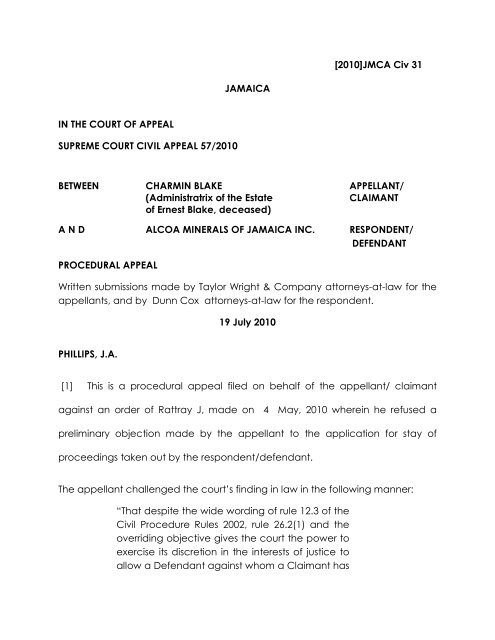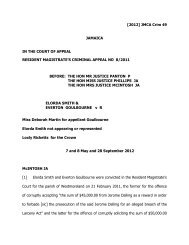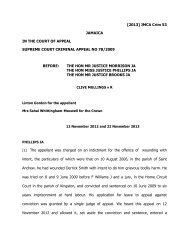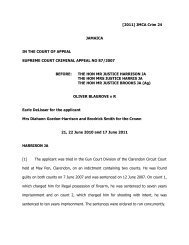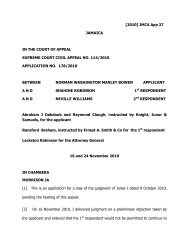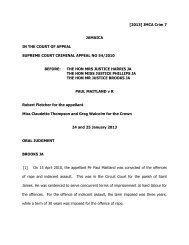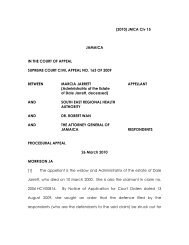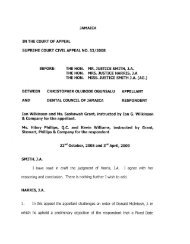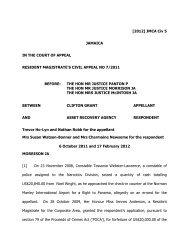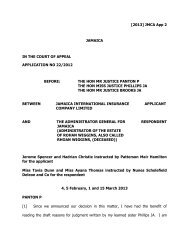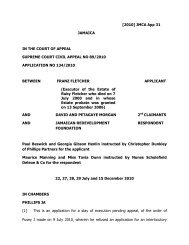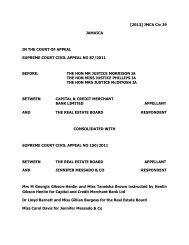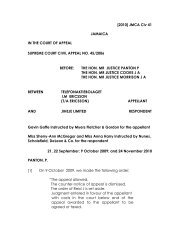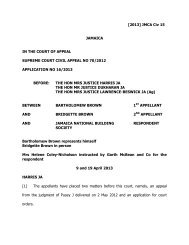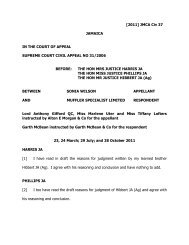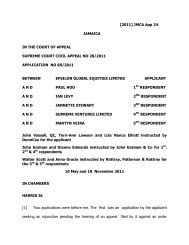Blake _Charmin_ v Alcoa Minerals of Jamaica Inc.pdf - The Court of ...
Blake _Charmin_ v Alcoa Minerals of Jamaica Inc.pdf - The Court of ...
Blake _Charmin_ v Alcoa Minerals of Jamaica Inc.pdf - The Court of ...
You also want an ePaper? Increase the reach of your titles
YUMPU automatically turns print PDFs into web optimized ePapers that Google loves.
[2010]JMCA Civ 31JAMAICAIN THE COURT OF APPEALSUPREME COURT CIVIL APPEAL 57/2010BETWEEN CHARMIN BLAKE APPELLANT/(Administratrix <strong>of</strong> the EstateCLAIMANT<strong>of</strong> Ernest <strong>Blake</strong>, deceased)A N D ALCOA MINERALS OF JAMAICA INC. RESPONDENT/DEFENDANTPROCEDURAL APPEALWritten submissions made by Taylor Wright & Company attorneys-at-law for theappellants, and by Dunn Cox attorneys-at-law for the respondent.19 July 2010PHILLIPS, J.A.[1] This is a procedural appeal filed on behalf <strong>of</strong> the appellant/ claimantagainst an order <strong>of</strong> Rattray J, made on 4 May, 2010 wherein he refused apreliminary objection made by the appellant to the application for stay <strong>of</strong>proceedings taken out by the respondent/defendant.<strong>The</strong> appellant challenged the court’s finding in law in the following manner:“That despite the wide wording <strong>of</strong> rule 12.3 <strong>of</strong> theCivil Procedure Rules 2002, rule 26.2(1) and theoverriding objective gives the court the power toexercise its discretion in the interests <strong>of</strong> justice toallow a Defendant against whom a Claimant has
heard on 10 June 2010.<strong>The</strong> respondent then filed the application to stayproceedings and it was at the hearing <strong>of</strong> that application that the preliminarypoint was taken by counsel on behalf <strong>of</strong> the claimant objecting to the hearing<strong>of</strong> that application, which was refused and forms the basis <strong>of</strong> this appeal. <strong>The</strong>appellant took the position that the respondent’s application was misconceivedsince the only rights available to the respondent following theentry <strong>of</strong> thedefault judgment were as circumscribed by rule 12.13, being that the case wasclosed unless there was in fact an orderobtained to set aside the defaultjudgment.[5] <strong>The</strong> appellant relied on the specific wording <strong>of</strong> rule 12.13, and what theappellant submitted was trite law, in that civil litigation commences with theclaim form or the fixed date claim form and ends with a judgment, obtainedafter a trial on the merits <strong>of</strong> the case or by default <strong>of</strong> one party acknowledgingservice or defending the claim. Thus, the argument runs, having obtained thejudgment in default, the litigation was at an end, and the lawsuit is effectivelyterminated until and unless the judgment is set aside.<strong>The</strong> appellant furthersubmitted that rule 26 <strong>of</strong> the Civil Procedure Rules (CPR), on which therespondent relied, did not apply and as the application before the court wasnot for a stay <strong>of</strong> execution and no attempt had been made to enforce thejudgment, then any attempt to stay proceedings would be in vain as the
proceedingswere already terminated, and the matters on which therespondent could be heard pursuant to rule 12.13 were very clear.[6] Counsel relied on the case <strong>of</strong> Delroy Rhoden v Construction DevelopersAssociates Limited and Trevor Reid, SCCA No. 42/2002 delivered on 18 March2005, to say that any proceedings embarked upon after the entry <strong>of</strong> a defaultjudgment, while that judgment remained extant, would be a nullity. Counselconcluded that the learned trial judge had therefore fallen into error as noproceedings remained to be stayed, the proceedings having already beenterminated.[7] <strong>The</strong> respondent in reply submitted that the respondent had not receivedby registered post or otherwise the sealed copies <strong>of</strong> the claim form or amendedclaim form and/or the particulars <strong>of</strong> claim or amended particulars <strong>of</strong> claim. <strong>The</strong>respondent only became aware <strong>of</strong> the proceedings when the application wasfiled to obtain judgment in default and, when the respondent became awarethat the default judgment had been entered against it, took steps to set thesame aside. That application came up for hearing but was not heard, as theclaimant required time to respond to certain affidavits filed on behalf <strong>of</strong> therespondent. It was the respondent’s contention that in spite <strong>of</strong> knowing aboutthe application to set aside the default judgment, which had been adjournedat her request, and that a date had been fixed for the hearing <strong>of</strong> the same, inJune, 2010, the claimant none the less proceeded to serve a bill <strong>of</strong> costs,
thereby endeavouring to enforce the judgment, thus the filing <strong>of</strong> the applicationto stay all proceedings pending the outcome <strong>of</strong> the application to set aside thejudgment.[8] <strong>The</strong> respondent’s application for a stay <strong>of</strong> proceedings was not heard,although the learned trial judge ruled that he was prepared to allow it toproceed, but he also granted leave to appeal. <strong>The</strong> respondent submitted thatrule 12.13 does not apply to an application involving the court’s casemanagement powers or general powers to act in the interests <strong>of</strong> justice. <strong>The</strong>respondent also submitted that the rule should be interpreted in the context <strong>of</strong>the overriding objective and that clear words would be necessary to oust thejurisdiction <strong>of</strong> the court to make orders ancillary to applications before it, whichare necessary in the interest <strong>of</strong> justice. Additionally the respondent relied on rule26.1 (2) (e), which permits the court to stay the whole or part <strong>of</strong> any proceedingsgenerally or to a specified event. Further in rule 26.2 (1) the court can act andmake orders on its own initiative. It was therefore submitted that rule 12.13 doesnot affect those case management powers <strong>of</strong> the court. <strong>The</strong> respondent reliedon rule 26 as a complete answer to the application before the learned judgeand also before this court.[9] <strong>The</strong> respondent also submitted that in any event its application fell squarelywithin rule 12.13 (a) and (c) as the order included one <strong>of</strong> costs and the claimant
was trying to enforce that aspect <strong>of</strong> the order. <strong>The</strong> respondent could thereforebe heard on an application to stay those proceedings as there is no limitationon the issues which may be heard in relation to costs and enforcement.[10] <strong>The</strong> respondent challenged the claimant’s contention that the defaultjudgment terminated the proceedings submitting that if that were so then therules would not provide for the setting aside <strong>of</strong> the judgment. <strong>The</strong> respondentalso challenged the position taken by the claimant that it had not applied for astay <strong>of</strong> execution, as it contended that a stay <strong>of</strong> proceedings included a stay<strong>of</strong> execution, as it brought all proceedings to a pause which also included astay <strong>of</strong> execution, and so an application for a stay <strong>of</strong> proceedings was widerthan and includes a stay <strong>of</strong> execution.[11] <strong>The</strong> respondent submitted that the Delroy Rhoden case did not apply.Counsel for the respondent also submitted that the learned judge was correctin rejecting the preliminary objection, as the taxation proceedings were a part<strong>of</strong> the proceedings as a whole, and rule 26 was therefore applicable and thecourt has the power to order a stay <strong>of</strong> proceedings in the circumstances.Analysis[12] This claim relates to a breach <strong>of</strong> contract, to wit an option agreement(number B-EX-206) made between the parties on 29 November 1985, whereinErnest <strong>Blake</strong> deceased was to exchange certain lands he owned for certain
lands belonging to the respondent. However, as the latter lands had sink holes,(alternatively) a separate agreement was entered into between the parties, on8 April 1991, wherein the respondent agreed to give to Mr. <strong>Blake</strong> an additional ¾acres <strong>of</strong> land in final settlement and to compensate him for loss <strong>of</strong> crops. <strong>The</strong>rewas yet a further agreement in January 2003 to allegedly resolve the impassewhereby the respondent agreed to transfer to Mr. <strong>Blake</strong> one parcel <strong>of</strong> landcomprising 3 acres <strong>of</strong> land in Mocho. <strong>The</strong> claimant indicated that it intended torely on the 3 agreements and pre-checked diagrams Nos. 215883 and 106946and letter dated 3 October 2001 from the respondent. <strong>The</strong> particulars <strong>of</strong> claimexpanded on these claims and stated how the agreements came about,allegedly to facilitate the mining <strong>of</strong> the respondent on the land <strong>of</strong> thedeceased.[13] On 21 September 2009 on an application for court orders, made by theclaimant and in the absence <strong>of</strong> the respondent, Evan Brown J, made thefollowing orders, namely the default judgment, which was entered in judgmentbinder 747 folio190:“1. W & L Associates Ltd., Real Estate Appraisers <strong>of</strong> 27ABeechwood Avenue, Kingston 5 in the parish <strong>of</strong> St.Andrew be appointed as Valuator for the purpose<strong>of</strong> providing a report on the market value <strong>of</strong> all thatparcel <strong>of</strong> land, comprising three (3) acres as well asthe replacement value <strong>of</strong> the house which wasaccepted by the deceased by way <strong>of</strong> exchangefor his original land and dwelling house inaccordance with Property Option Agreement No. B-
E-X-206. <strong>The</strong> valuation should include cost <strong>of</strong> fencingthe land, an estimate <strong>of</strong> the value <strong>of</strong> 15 citrusseedlings, a tank <strong>of</strong> 2000 gallon capacity and a pitlatrine measuring 22.5 square feet.2. <strong>The</strong> Defendant do pay to the estate the amountassessed by the Valuator as the market value <strong>of</strong> thesaid land, house, seedlings, tank, fence and pitlatrine within 180 days <strong>of</strong> the date <strong>of</strong> this Order.3. That in accordance with clause 10 (c) <strong>of</strong> the OptionAgreement No. B-E-X-206 the Defendant do pay tothe estate a cash payment in the sum <strong>of</strong> $62,088.39.4. That interest be awarded in the sum <strong>of</strong> 15% perannum on the said sum from the 26 th day <strong>of</strong>November, 1985 to the date here<strong>of</strong>.5. Costs to the Claimant to be taxed or agreed.6. Order to be prepared and filed by Claimant’sAttorneys- at-law.”It is clear from the above judgment <strong>of</strong> Brown, J (Ag) that a valuation <strong>of</strong> (1) threeacres <strong>of</strong> property, (2) replacement <strong>of</strong> a house, (3) cost <strong>of</strong> fencing (4) 15 citrusseedlings, (5)a tank <strong>of</strong> 2000 gallon capacity, and (6) a pit latrine measuring 22.5square feet, would have to be done before the judgment can be effected.[14] I must state right away, that although the submissions <strong>of</strong> both counselrefer to the application to set aside the default judgment and to the applicationto stay the proceedings, neither <strong>of</strong> those applications was in the bundle <strong>of</strong>documents submitted to me, but I assume that the former having been filed inNovember, 2009 and the latter in March 2010, that Rattray, J who was hearing
the matter in May, 2010 would have had sight <strong>of</strong> both applications on the courtfile before him. In my view, this matter can be disposed <strong>of</strong> quite quickly.[15] <strong>The</strong> appellant has submitted that on the entry <strong>of</strong> a default judgment thelaw suit is terminated unless and until it is set aside. This however would only beso if the default judgment relates to a specified or liquidated sum and thejudgment entered is therefore a final judgment and nothing remains except toenforce it. This is not so if the judgment entered in default is an interlocutoryjudgment with damages to be assessed or in respect <strong>of</strong> which some otherremedy is claimed which has to be determined. At the interlocutory judgmentstage, it is only liability which has been determined between the parties.[16] <strong>The</strong> appellant has also relied on the entry <strong>of</strong> the default judgment totrigger rule 12.13 <strong>of</strong> the CPR, which limits the matters on which the defendantcan be heard, but the preamble to that rule states, “unless the defendantapplies for and obtains an order for the judgment to be set aside”. Thatapplication has already been filed and when heard, if an order is made infavour <strong>of</strong> the defendant, the claimant would not be able to proceed on thejudgment, and the application for the stay <strong>of</strong> proceedings as set out incounsel’s submissions sought the stay only pending the outcome <strong>of</strong> thatapplication.
[17] In the submissions <strong>of</strong> counsel for the defendant, counsel stated that it wasthe defendant’s contention that it had never received the original documentsfiled on behalf <strong>of</strong> the claimant. <strong>The</strong> claimant has put before me as exhibit “DB1”, attached to an affidavit <strong>of</strong> service <strong>of</strong> registered post <strong>of</strong> Donna Barracks, acertificate <strong>of</strong> posting which is addressed to, “Jamalco lands and mineEngineering, 13 Waterloo Road, Kingston 10”. This, on the face <strong>of</strong> it, appears tobe a different company, from the defendant sued herein, but that is somethingthat will have to be decided by the court hearing the application to set asidethe default judgment, as to whether it is a judgment entered irregularly andtherefore must be set aside ex debito justitiae, or whether if properly served, thedefendant would be required to show that it has a realistic prospect <strong>of</strong>successfully defending the case and can satisfy the other considerations set outin rule 13.3.[18] In the meantime though, the appellant wishes to enforce the costsordered by the court and has filed a bill <strong>of</strong> costs, and is proceeding to have thecosts taxed in order no doubt to collect the same, and then one would expect,would be proceeding also to have the valuation done in order to effect thedefault judgment entered by E. Brown, J (Ag). <strong>The</strong>re is no evidence that thevaluation has been requested but the stay <strong>of</strong> proceedings could affect thevaluation being done if the application is granted, and if the valuation has notyet been requested, then no harm would have resulted, if that too is made toultimately await the application to settle the rights under the judgment entered
in default between the parties. However, one must remember that this is not anappeal from the application to stay proceedings but from the refusal <strong>of</strong> thejudge to restrain that application from being heard.[19] <strong>The</strong> real issue then is, is this a proper use <strong>of</strong> the court’s process? Do therules permit it? Was the learned judge correct?It is important to remember that the learned trial judge in utilizing thecourt’s general case management powers was exercising a discretion, and itwould therefore be incumbent on the appellant to show that he erred inprinciple. Rule 1.2 <strong>of</strong> the CPR states:Rule 1.3 states:“<strong>The</strong> court must seek to give effect to the overridingobjective when interpreting these rules or exercisingany powers under these rules. ““It is the duty <strong>of</strong> the parties to help the court to furtherthe overriding objective.”It is accepted though and the court must be mindful, as made clear in thejudgment <strong>of</strong> Kay, L.J in Totty v Snowden [2001] 4 All ER 577, that even though therules require the court to have regard to the overriding objective in interpretingthe rules, “Where there are clear express words, as pointed out by Peter Gibson,LJ in Vinos’ case, the court cannot use the overriding objective ‘to give effect towhat it may otherwise consider to be the just way <strong>of</strong> dealing with the case’.”
However, “Where there are no express words, the court is bound to look atwhich interpretation would better reflect the overriding objective”.<strong>The</strong>re is no doubt therefore that the court in interpreting the rules must at alltimes give effect to the overriding objective, and to that extent in thecircumstances <strong>of</strong> this case, in dealing with the case justly, would includealthough would not be limited to, being focused on and endeavouring toensure that the matter was dealt with expeditiously and fairly, while savingexpense and not utilizing too much <strong>of</strong> the court’s time.[20] Under Part 26, dealing with the court’s general powers <strong>of</strong> management, inrule 26.1 (2) (e), the court clearly has the power to stay the whole or part <strong>of</strong> anyproceedings generally or until a specified date or event.In this case thespecified date or event would be the determination <strong>of</strong> the application to setaside the default judgment. <strong>The</strong> court also can exercise its powers on anapplication or <strong>of</strong> its own initiative, (26.2 (1)) so even without hearing theapplication for stay which if this appeal succeeds would still be pending, thecourt could in the exercise <strong>of</strong> its own protection <strong>of</strong> its process, and in order toavoid duplication <strong>of</strong> hearings, stay all proceedings in the matter until theapplication envisaged under rule12.13 has been heard and determined.[21] As indicated earlier in this judgment I do not know whether theapplication to set aside the default judgment has been heard, but it is certainly
my view that that is the application in which the parties should haveconcentrated their energies. That application should be heard. <strong>The</strong>re ought tobe an outcome in respect there<strong>of</strong> as quickly as possible. <strong>The</strong> judgment may beset aside. In that case there would not seem to be any useful purposeproceeding with the valuations as required under the judgment, and also withthe taxation <strong>of</strong> costs at this stage. If the application is not successful then theclaimant should pursue enforcing its judgment and costs without restraint. All <strong>of</strong>this is particularly important, if the respondent can show that it was not properlyserved with the originating documents.[22] Part 26, in my view was promulgated for just these purposes, for the courtto manage the cases through its general powers, and by doing so, make thebest use <strong>of</strong> the court’s time. I am also <strong>of</strong> the view that rule 12.13 acknowledgesthat if the defendant applies for and obtains an order setting aside the defaultjudgment, then that particular provision would have no applicability to thatdefendant, as he would be able to be heard generally inthe action. <strong>The</strong>limitations relating to the matters on which one could be heard would no longerbe relevant. <strong>The</strong>re are no express provisions prohibiting the defendant frommaking an application to stay the proceedings in order for it not to be limited tothose matters set out in rule 12.13.[23] In any event, costs were awarded on the default judgment and theclaimant has filed a bill <strong>of</strong> costs in an effort to pursue enforcement <strong>of</strong> that
aspect <strong>of</strong> the judgment. I agree with counsel for the respondent that based onthe strict interpretation <strong>of</strong> rule 12.13, the respondent ought to be able to beheard in respect <strong>of</strong> rule 12.13 (a) and (e) as those subsections relate to costsand enforcement.<strong>The</strong> application to stay the proceedings would be themeans by which the respondent would be heard, bearing in mind that it wouldbe pending the outcome <strong>of</strong> the application to set aside the default judgmentwhich is envisaged as stated in the preamble to the provision.[24] Under the former regime, namely the civil procedure code, this court, in<strong>The</strong> <strong>Jamaica</strong> Record Limited et al v Western Storage Ltd (1990) 27 JLR, whenlooking at the question as to whether to proceed to hear a summons toproceed to assessment which was set for hearing on the particular day, or topermit an adjournment to hear a summons to set aside a default judgmentwhich was on the court file, but not yet fixed for hearing, the court below havingmade the order on the summons to proceed to assessment, made the followingobservations. <strong>The</strong> court ought to have considered whether it was more desirableand for practical reasons to hear the latter summons first. <strong>The</strong> Master shouldhave considered whether the refusal <strong>of</strong> the adjournment could not arguably,albeit erroneously, be said to have been predicated on a view that theapplication to set aside the judgment <strong>of</strong> which he was aware was withoutmerit, and that its subsequent dismissal would be a mere formality. So althoughnot a rule <strong>of</strong> law, common sense, economy in the use <strong>of</strong> judicial time, and theavoidance <strong>of</strong> any suggestion that a matter has been pre determined without
a hearing, would require that as far as possible, the procedure should beadopted that the summons to set aside the default judgment <strong>of</strong> which the courtis aware be heard and determined before hearing the summons to proceed toassessment <strong>of</strong> damages.[25] In the instant case, hearing the application for the stay <strong>of</strong> proceedingwould have the similar effect <strong>of</strong> hearing, by way <strong>of</strong> common sense, and withthe economy <strong>of</strong> the use <strong>of</strong> judicial time, whether there should be further actionon a default judgment, when the court is aware that the defendant is seeking toset it aside, on the basis inter alia, <strong>of</strong> non-service <strong>of</strong> the originating documents.[26] <strong>The</strong> case <strong>of</strong> Delroy Rhoden v Construction Developers Associated Limitedrelied on by the appellant is not applicable to this case, as in that case, theparties continued to conduct the litigation subsequent to the default judgmenthaving been obtained, although inadvertently without the defendant’sknowledge, and without the defendant attempting to have the defaultjudgment set aside. In this case, to the contrary, the defendant is pursuinghaving that application heard.[27] I am <strong>of</strong> the view that the learned trial judge was quite correct in theexercise <strong>of</strong> his discretion to refuse the preliminary objection so that theapplication <strong>of</strong> stay <strong>of</strong> proceedings could proceed.
[28] I therefore hereby order that the parties should proceed to hear theapplication for stay <strong>of</strong> proceedings, but in my view, their time and energieswould be better spent in pursuing the application to set aside the defaultjudgment and to obtain a ruling thereon and be guided accordingly.<strong>The</strong> appeal is dismissed with costs to the respondent.


